Last Updated on November 21, 2024 by chanuka chanuka.23e2
Updated: November 21, 2024
Selecting the perfect deck railing is crucial for enhancing your outdoor space’s safety, aesthetics, and functionality. With a wide range of styles and materials available, you can customize your railing to suit your needs and preferences. This guide will help you navigate the options and make the best choice for your deck.
Key Takeaways
- Variety of Styles: Deck railings come in designs like glass, cable, wood, and wrought iron, catering to traditional and modern tastes.
- Material Matters: Materials like aluminum and composite offer durability, while wood and vinyl provide affordability and charm.
- Balancing Cost and Aesthetics: Railings can range from budget-friendly wooden options to high-end glass designs, ensuring something for everyone.
- Customization is Key: Art Metal offers tailored solutions to match your home’s unique style, combining beauty and functionality.
Adding those finishing touches to your deck? Consider the various types of deck railings to enhance your outdoor space. Let’s delve into some popular styles and materials, their benefits, and potential drawbacks to help you make an informed decision!
Deck Railing Styles
- Glass Deck Railings: These deliver a clean, modern feel, and do not obstruct the view from your deck while ensuring safety.
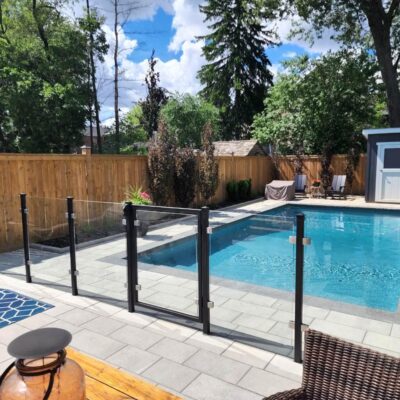
-
- Pros: Maximizes view, creates an illusion of a larger space, wind resistant.
- Cons: Requires frequent cleaning, scratches visible, can be pricey depending on quality of glass used.
- Cable Deck Railings: Using stainless steel cables for safety, these railings provide a minimalist and chic design that does not block your view
-
- Pros: Excellent views preserved, contemporary look, high durability, easy maintenance.
- Cons: Can be costly as setup requires skilled labor and good quality components, horizontal cables can be unsafe for pets and young kids.
- Wooden Deck Railings: Wooden railings offer a classic and timeless look that adds a warm, inviting feel to your outdoor living space.
-
- Pros: Offers a natural aesthetic, cost-effective, can be painted or stained for a customized look.
- Cons: Requires regular maintenance such as sealing and staining, more susceptible to conditions like rot and pests.
- Aluminum Deck Railings: These are appreciated for their durability, low-maintenance requirement, and relatively lightweight construction.
-
- Pros: Corrosion-resistant, easily customizable with different paints and finishes, very durable.
- Cons: Heat absorbent, might be expensive.
- Wrought Iron Deck Railings: These railings bring a traditional and royal touch to your deck with their intricate designs.
-
- Pros: Highly durable and sturdy, not easily damaged, can be shaped into various unique designs.
- Cons: Heavy and difficult to install, more expensive, susceptible to rust if not adequately treated.
- Steel Deck Railings: These are the right choice for the homeowners who prefer modern design profiles and high durability, steel deck railings are the perfect pick.
-
- Pros: Robust and durable, modern appeal, less likely to warp or twist than wood.
- Cons: Can rust if not properly treated, can be expensive, heat absorbent under direct sunlight.
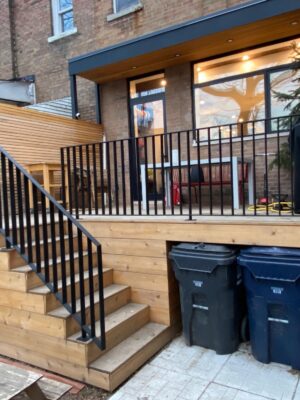
Deck Railing Materials
- Wood: A classic choice offering a warm, natural aesthetic, generally made from Cedar, Redwood, or hardwoods like Ipe.
-
- Pros: Natural look, easily customizable, cost-effective for some woods.
- Cons: High maintenance, longevity varies with wood type.
- Composite: A durable material made from wood fibers and plastic, imitating wood while being more weather-resistant.
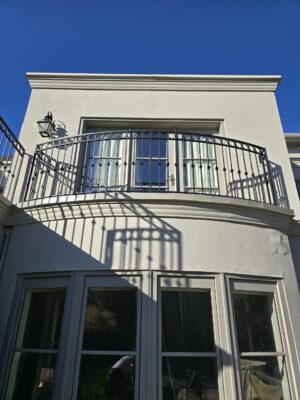
-
- Pros: Rot-resistant, low maintenance, mimics real wood.
- Cons: More expensive than most woods, could stain or foster mildew.
- Vinyl: An affordable, durable material that withstands weather and pests well, requiring low maintenance.
- Pros: Weather and pest-resistant, safe (no peeling/splintering), low maintenance.
- Cons: Limited designs and colors, synthetic look not for everyone.
- Aluminum: Lightweight metal offering similar strengths as heavier metals, but rust-resistant.
- Pros: Lightweight, affordable, rust-resistant.
- Cons: More contemporary look may not suit all homes, cost can be higher than other materials.
- Wrought Iron and Steel: Sturdy metals for a traditional or robust modern style, requiring maintenance to avoid rust over time.
-
- Pros: Tough and durable, unique designs possible.
- Cons: Can rust if not properly maintained, can be expensive, may absorb heat.
- Glass: Creates a modern, open feel, often using tempered or laminated glass for safety.
-
- Pros: Opens view, modern aesthetic.
- Cons: Requires regular cleaning, not safe in some conditions or for families with young children or pets.
- Cable: Sturdy stainless-steel cables strung between posts for a minimalist, contemporary look.
- Pros: Durable, minimal view obstruction, low maintenance.
- Cons: Professional installation required, may not be safe with children or pets due to horizontal design.
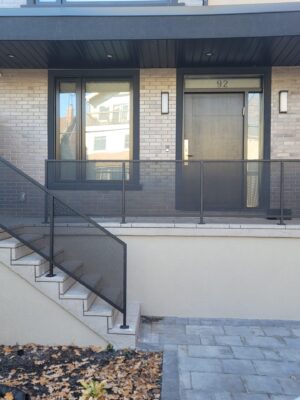
What’s The Cost Of Deck Railings?
Here’s an average cost comparison table for each type of deck railing:
| Railing Material | Estimated Cost Per Linear Foot |
| Wood | $15 – $50 |
| Composite | $30 – $60 |
| Vinyl | $20 – $40 |
| Aluminum | $40 – $75 |
| Wrought iron | $50 – $120 |
| Steel | $50 – $120 |
| Glass | $60 – $150 |
| Cable | $40 – $60 |
These costs include both materials and labor. As a rule, labor usually accounts for one-third to one-half of the total cost. Always check with local suppliers or contractors for the most accurate pricing.
Art Metal Deck Railings
Art Metal believes in individuality. We provide unique deck railings that reflect your home’s uniqueness. Our design range includes:
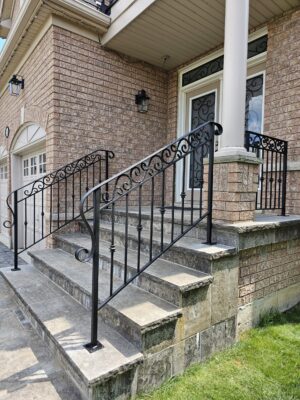
- Baroque railings: Luxury featuring detailed scrolls
- Minimalistic railings: Modern, clean lines with metal or mixed with wood
- Decorated railings: Bridge the gap between simplicity and ornate styling
- Wavy railings: Breaks away from traditional patterns
As a top-rated Toronto contractor, we use various durable materials:
- Metal: Timeless, versatile, and durable
- Vinyl: High durability, low maintenance with design flexibility
- Glass: Stunning aesthetics, low maintenance, high visibility
- Cable: Minimal, low maintenance, flexible design
Choose Art Metal for craftsmanship that enhances your home, withstands use and weather, delivering quality, durability, and service. Trust us to add functionality and beauty to your deck!
FAQs
What is the most durable material for deck railings?
Last Updated on November 21, 2024 by chanuka chanuka.23e2
Steel and aluminum are among the most durable materials, offering excellent longevity and weather resistance.
Are glass deck railings safe?
Last Updated on November 21, 2024 by chanuka chanuka.23e2
Yes, glass railings made from tempered or laminated glass are designed for safety and durability.
How often should wooden railings be maintained?
Last Updated on November 21, 2024 by chanuka chanuka.23e2
Wooden railings require staining or sealing every 1-3 years, depending on exposure to elements and the type of wood used.
Can deck railings be customized to match my home's style?
Last Updated on November 21, 2024 by chanuka chanuka.23e2
Absolutely! Art Metal specializes in creating custom deck railings that reflect your home’s aesthetic and functional needs.
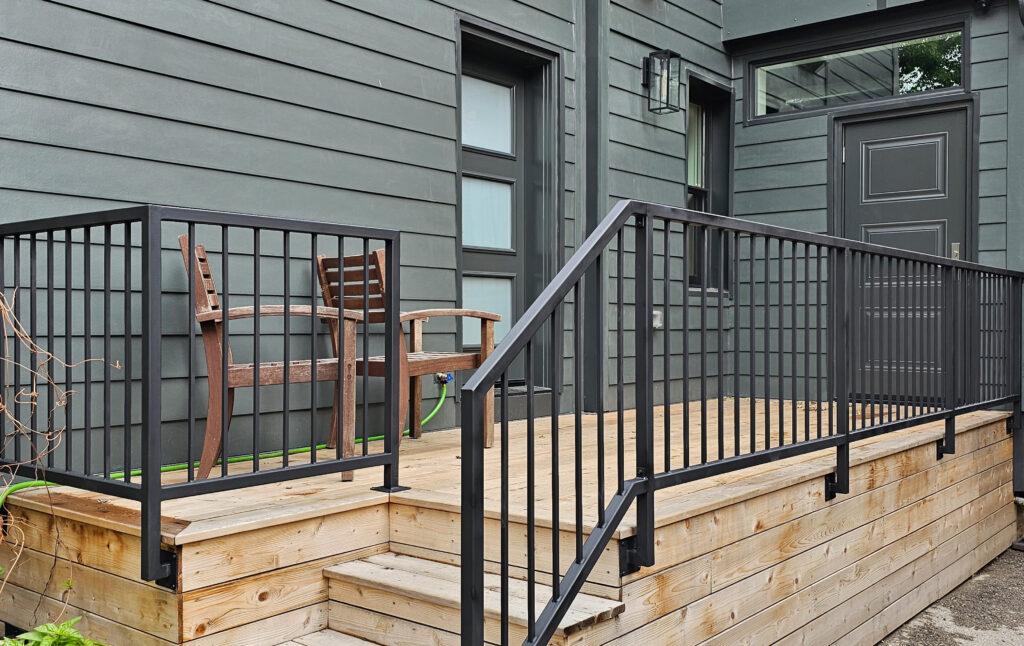
 Chat
Chat 








